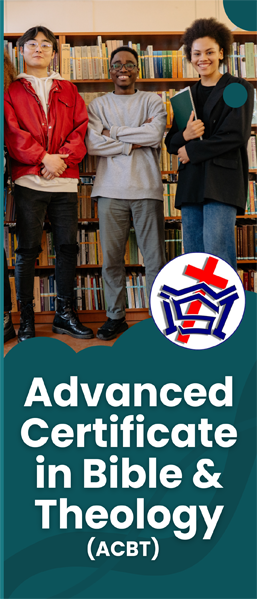Diploma in Bible & Theology
The Diploma in Bible & Theology is designed to provide a basic Bible-based, cognitive, and spiritual foundation for effective ministry. The programme also provides a foundation for undergraduate studies. It comprises of the Institutional Core (36 credits) and the courses pertaining to the Major you have decided to pursue.
- You desire to be trained for Christian Ministry.
- You are thinking about or are already engaged in Christian ministries (Youth Ministry, Men’s Ministry, Women’s Ministry, Music etc).
- You are already functioning in a leadership role in the church.
- You sense the call to one of the fivefold ministries (Apostle, Prophets, Evangelist, Pastors & Teacher)
- You desire foundational knowledge for further studies.
- You desire to be a credential worker in PAWI.
- Develop an understanding of the overall nature, scope and impact of the chosen discipline.
- Demonstrate an understanding of the challenges and requirements of the chosen major.
- Demonstrate the knowledge, skills and abilities required for successful work in areas of specialization
- Demonstrate an understanding of the use of major strategies required to successfully engage in Christian ministry in the context of contemporary society;
- Develop knowledge, skills and competence to function effectively in the church settings.
- Demonstrate effective interpersonal and teamwork skills, appropriate to academic scholarship and/or further study
- Continue the process of effective lifelong learning
- Be prepared for undergraduate studies in related fields.
The major in Bible and Theology is designed to prepare persons who wish to develop competence in the interpretation of the Biblical text, and theology. It provides a thorough, biblically-based, cognitive, and spiritual foundation for effective ministry, particularly in fields related to Bible and Theology. It is designed to provide individuals with a solid Biblical foundation by developing the skills and confidence for sound Biblical interpretation.
Within the context of the overall programme participants will:
- Display knowledge and understanding of the essential principles and practices related to the field of Bible & Theology.
- Exhibit basic skills of observation, interpretation, and application in the study of the Bible.
- Identify and explain the significance of themes, events, and personalities found in the Old and New Testaments.
- Identify and describe the pertinent background, interpretive questions, and related information pertaining to books found in the Old and New Testaments.
- Reflect theologically on cultural practices and worldviews in light of the Bible.
- Apply appropriately, the Biblical teachings and principles learned in the course of study to life and service.
- Evaluate the nature and practice of Bible interpretation and communication in the context of cultural diversity.
- Communicate Biblical truth in a variety of instructional settings
Who is eligible to certify your documents?
An ordained minister, marriage Officer, District Officers or lawyers, Justice of Peace,
How to certify a Document?
To certify a document simply take a photocopied copy and the original and ask the person to certify the copy by:
- Writing ‘Certified to be a true copy of the original seen by me’ on the document.
- Signing and dating it.
- Printing their name under the signature.
- Adding their occupation, address and telephone number.
- An official stamp
Programme Construction ( 81 Credits=27 courses)
The entire programme consists of 81 credits or 27 courses which each carry a 3-credit weight. The institutional core carries 36 credits and the major carries 45 credits.
Institutional Core - 36 credits
Old Testament Survey I
Old Testament Survey II
Old Testament Survey III
New Testament Survey I
New Testament Survey II
New Testament Survey III
Theology I
Theology II
Theology III
Spiritual Formation
Pentecostal History &
Distinctives
Growing a Great Commission Church
Emphasis Core - 45 credits
Gospels
Wisdom Literature
Contemporary Theology
Pauline Epistles
Pastoral Epistles
Major & Minor Prophets
Old Testament Theology
General Epistles
New Testament Theology
Apocalyptic Literature
Principles of Teaching
New Testament Greek I
Hermeneutics
Homiletics I
Bible & Theology Internship-Year I
Electives
Research Methods
Admission Requirements
ACADEMIC REQUIREMENTS :
At least three (3) CXC/GCE Ordinary Level passes (General I, II, or III [after June 1998] or grades A, B, or C), which must include English Language.
OR
Satisfactory completion of WIST’s Certificate Programme.
OR
MATURE ENTRY ROUTE Persons without a formal entry qualification may gain entry through the mature route known as the Bridge Programme.
REQUIRED DOCUMENTS
A certified copy of your academic qualifications.
A certified copy of one form of national identification
A certified copy of your birth certificate.
A standard size passport picture (2 x 2 /3.5 x 4.5 inches).
Two (2) recommendations – One (1) from your Pastor and the other from a teacher/leader/corporal/businessperson outside your immediate family.
See official form HERE!
For credit transfers – copy of your transcript for assessment. The official transcript must be emailed directly by the institution to the West Indies School of Theology to: registrar@wistef.com and assistant.registrar@wistef.com.
Price Info
Administrative Fee – TT $2,000 (Annually)
Course Registration Fee – TT $275 x (Number of Courses)
Tuition – TT $1,275 x (Number of Courses)
This programme is GATE approved but students are subject to the Ministry of Education’s stipulated criteria in order to qualify for funding.
Payment plans are available.
The Way Forward
You can complete a Bachelor of Arts degree by completing 48 credits beyond the diploma which are obtained from a list of electives, and a second internship.
Intake
Student intake occurs for both January and September semesters annually.





